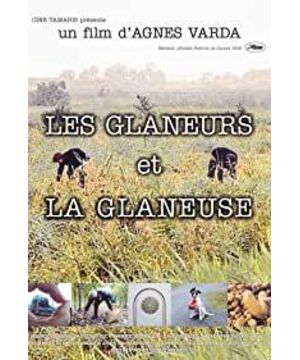It's the new wave again, and the grandmother of the new wave again! Sometimes I really hate those technical terms. It always labels the director of the work as one category, thinking that it will master the work and understand the world. The problem is not only here, I just happened to watch "Gleaner" and ran into a woman named Varda, nothing more. Gleaners, they never thought that they were picking up the ears for a name called "Gleaners." The same is true for trash pickers to pick up the urban rubbish.
They saw that there was still something to pick up after the harvest, and there was something usable in the trash, so they did it. Think of a nursery rhyme: "I picked a penny on the side of the road and gave it to the police uncle." Not because I deliberately picked up the money that fell on the ground, nor was it because I wanted to be a moral model to pick that penny, but it was at my feet. I found it and felt that it should not be "waste". That's it. Demonstration of fucking morality, fucking meaning and value, this is the existence itself, the latter is the existence, the existence is manifested by itself, and it is only presented as an event.
Whenever those famous people recall their childhood, it is inevitable to talk about the childhood study: my ideal. They have all realized their ideals, even if they are not consistent, they will make the writing of these successful people have extraordinary meaning, and the two work together to become a kind of ideal children's education and continue to this day. In essence, they just wrote a composition for elementary school students.
Whether it is memories or prospects for the future, we have exaggerated the meaning of existence, making it an existence, constructing the image of children in the memory, eager to achieve the image of the future, and using these images to redefine our present. Existence is Obscured.
The biggest paradox of "Gleaner" as a new wave work is that Varda tries to show existence itself, but gives things a kind of role or image. The event and existence itself require us to describe with words, observe with concepts, and use The light of knowledge illuminates the darkness, but is lost in the light, and thus explores its meaning, in an attempt to search for something of value in another world, cover the event itself, and make it noble. Varda tempts his interviewees to jointly construct a world full of values created by rubbish.
Whether those famous people really remember the dreaming ideals described in their childhood essays, I am skeptical, but it is not important. The important thing is to beautify the existence itself and make it an existence. Existence is nothingness. With ideals, we plan ourselves according to the image of ideals, we are beings. The ideal education we receive is the education of beings, not the education of beings.
The one in "Gleaner" who has a master's degree but picks up edible items that people throw away every day, he builds his life on the "garbage" we spurn. He also voluntarily uses one to two hours a day for free to educate immigrants and teach French learning. Our idealized education rejects them. We are always eager to become a certain "tall" image. Of course, I don't want to interpret the "low" spirit that is worthy of our study, in order to fight against that kind of ideal education.
When Varda tried to show it as the event itself, of course, compared to the film "Happiness", she did not do it thoroughly here. What she really wanted to tell people was the kind of ideal education and the kind of existentialism. How ridiculous the value is, they did not do it for a certain ideal value concept, nor did they do it for the filming of a famous director like Varda one day in the future. That's what they did, nothing more.
View more about The Gleaners & I reviews







